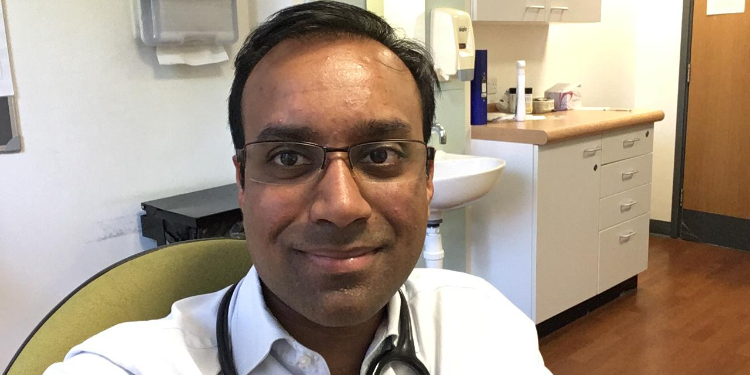
The coronavirus pandemic has brought many expatriates around the world on the frontline in various fields. Nilesh Sewpaul is a Mauritian doctor practising in Birmingham, UK. He talks about how the UK has been dealing with the COVID-19 outbreak and shares his personal feelings, away from his family.
Where are you from? What brought you to the UK and how long have you been there?
My name is Nilesh Sewpaul. I'm from Vacoas, which is a small town in Mauritius. I came to the UK in 2003 as a medical student and have stayed here ever since. After graduating from Birmingham Medical School in 2008, I moved to the South-East, where I continued my training. I now work as a full-time General Practitioner in Birmingham.
How is the current situation in the UK following the Covid-19 outbreak?
The UK has been hit hard with Covid-19. We currently have 15,00 confirmed cases, and the death toll has risen to 759. Over one-third of these cases are in London, but it has been spreading rapidly to most of the UK. The government is now trying to contain the spread of the virus. We are now on lockdown. The police are stopping cars and fining people who are travelling for non-essential affairs. People are being encouraged to work from home where possible.
What about healthcare services that are being offered to COVID-19 patients and those who are at risk? How are people responding?
The NHS (National Health Service) was already struggling before the outbreak of COVID-19 with a shortage of doctors and nurses. Sadly, the COVID-19 outbreak has put unprecedented pressure on the NHS. Due to a shortage of testing kits, many patients with symptoms of COVID-19 are not being tested. Instead, the national guidelines are for those people to self-isolate at home for 7 days and for their household members to self-isolate for 14 days. The advice is to ring 111 for further advice if feeling unwell. The NHS 111 helpline advises members of the public health on urgent medical problems and redirects those that need medical help to either their General Practitioner, Hospital, or organise an ambulance in cases of emergency.
Elderly and vulnerable people are being advised to self-isolate for a period of at least 12 weeks.
Initially, my feeling is that the general public was ignoring the advice from Public Health England but as the number of cases has risen rapidly over the past week, people are self-isolating as advised, and those who can go out are doing so only when essential. During the past week, there has been a sense of solidarity, with people trying to support each other where possible.
How do you feel regarding this health crisis as a health professional?
There as been a positive response from the general public towards health professionals. People showed their appreciation to the NHS last Thursday when everyone clapped outside their house at 8 pm in honour of the NHS. Numerous coffee chains were offering free drinks to NHS staff when they were still open last week.
Unfortunately, the UK was not well prepared for this COVID-19 outbreak. Surgeries across the country, including the one I work at, still have not received PPE (Personal Protective Equipment). We also have not received any testing kits yet. This is pushing staff with potential symptoms of COVID-19 to stay at home and self-isolate when they could have come to work. This is making the staff shortage even worse, at a critical time.
The health services are trying to maximise the limited current resources.
A local surgery where I work is being converted into a "COVID-19 Hot clinic" where suspected cases of COVID-19 will be assessed. They are currently looking for volunteer doctors to run the clinic. On a national scale, a temporary hospital has been set up at the Excel Centre in London. The National Exhibition Centre in Birmingham is looking at plans for a similar conversion to a temporary hospital.
Despite all the efforts from the government and the general public, I fear that the UK simply does not have the resources required to adequately deal with the COVID-19 outbreak. For my part, I am doing what I can to help by continuing to work at the General Practice Surgery, while taking precautions not to catch the virus.
Your personal feelings?
I am very grateful that my wife and I managed to get married in December 2019 in Mauritius before the COVID-19 outbreak. I consider myself very lucky that we are currently living together in Birmingham. The prospect of having to self-isolate is not as scary anymore. In fact, I think if we had to self-isolate for whatever reason, we would make the most of it.
How does it feel to be away from your family during this health crisis?
I do miss Mauritius, though, and both of us are thinking about our family. We cannot wait to go back. We were actually planning a surprise visit to our families in Mauritius in April but this is clearly not going to happen now due to COVID-19 and the quarantine rules in Mauritius.
Personally, I think the measures put in place by the Ministry of Health at the SSR international airport in Mauritius are appropriate. Unlike the UK and the other EU countries, they have been monitoring where the passengers have been in the last six months and quarantining/testing those who are at high risk.
What advice would you give as a health professional in the UK?
My advice to everyone would be to follow the advice that has been given by the public health in your country and stay indoors when needed for the benefit of everyone else. We are going through a tough phase at the moment and can get through this if we all work together.



















